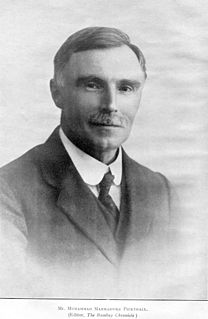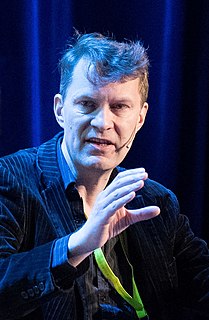A Quote by Michael Hayden
At the end of the 30 Years War then, Europe broadly decided to separate the sacred from the secular in its political culture. I know that is an oversimplification, but it is instructive, and it led to a growth in religious tolerance that has characterized the best of Western life since.
Related Quotes
In the eyes of history, religious toleration is the highest evidence of culture in a people. It was not until the Western nations broke away from their religious law that they became more tolerant, and it was only when the Muslims fell away from their religious law that they declined in tolerance and other evidences of the highest culture.
War and culture, those are the two poles of Europe, her heaven and hell, her glory and shame, and they cannot be separated from one another. When one comes to an end, the other will end also and one cannot end without the other. The fact that no war has broken out in Europe for fifty years is connected in some mysterious way with the fact that for fifty years no new Picasso has appeared either.
My four years in Russia end, then, in dramatic fashion: with a textbook Soviet-style expulsion. I am the first western staff correspondent to suffer this fate since the end of the Cold War. I'm stunned. But my expulsion is not, I reflect, a surprise. It's something I have always accepted as a real, if far-fetched, possibility.
The same failure of liberalism is evident in Western Europe, where the dogma of multiculturalism has left a secular Europe very slow to address the looming problem of religious extremism among its immigrants. The people who speak most sensibly about the threat that Islam poses to Europe are actually fascists. To say that this does not bode well for liberalism is an understatement: It does not bode well for the future of civilization.
The bloody years of war and all the atrocities in European history have taught the Europeans that secular politics free of religious hatred is mainly a question of peace. This concept is not anchored in the same way in the consciousness of Turks, which has to do with the fact that the secular was forced upon us by the army.
I have spent the last 30 years forming the religious right. I write a letter every week and send a newspaper every month to 200,000 pastors who are broadly called evangelicals, bringing them up to date on what is happening in Washington, in the state capitals, in the culture, and what we need to do about it. And of course I'm criticized for it, and of course I have calculated the positives and the negatives, but I have long been at peace with what I do.
A comprehensive doctrine, either religious or secular, aspires to cover all of life. I mean, if it's a religious doctrine, it talks about our relation to God and the universe; it has an ordering of all the virtues, not only political virtues but moral virtues as well, including the virtues of private life, and the rest. Now we may feel philosophically that it doesn't really cover everything, but it aims to cover everything, and a secular doctrine does also.
South Korea at the end of the Second World War had a very low level of literacy. But suddenly, like in Japan, they determined they were going in that direction. In 20 years' time, they had transformed themselves. So when people go on saying that it's all because of perennial culture, which you cannot change, that's not the way the South Korean economy was viewed before the war ended. But again within 30 years, people went on saying there's an ancient culture in Korea that has been pro-education, which is true.



































